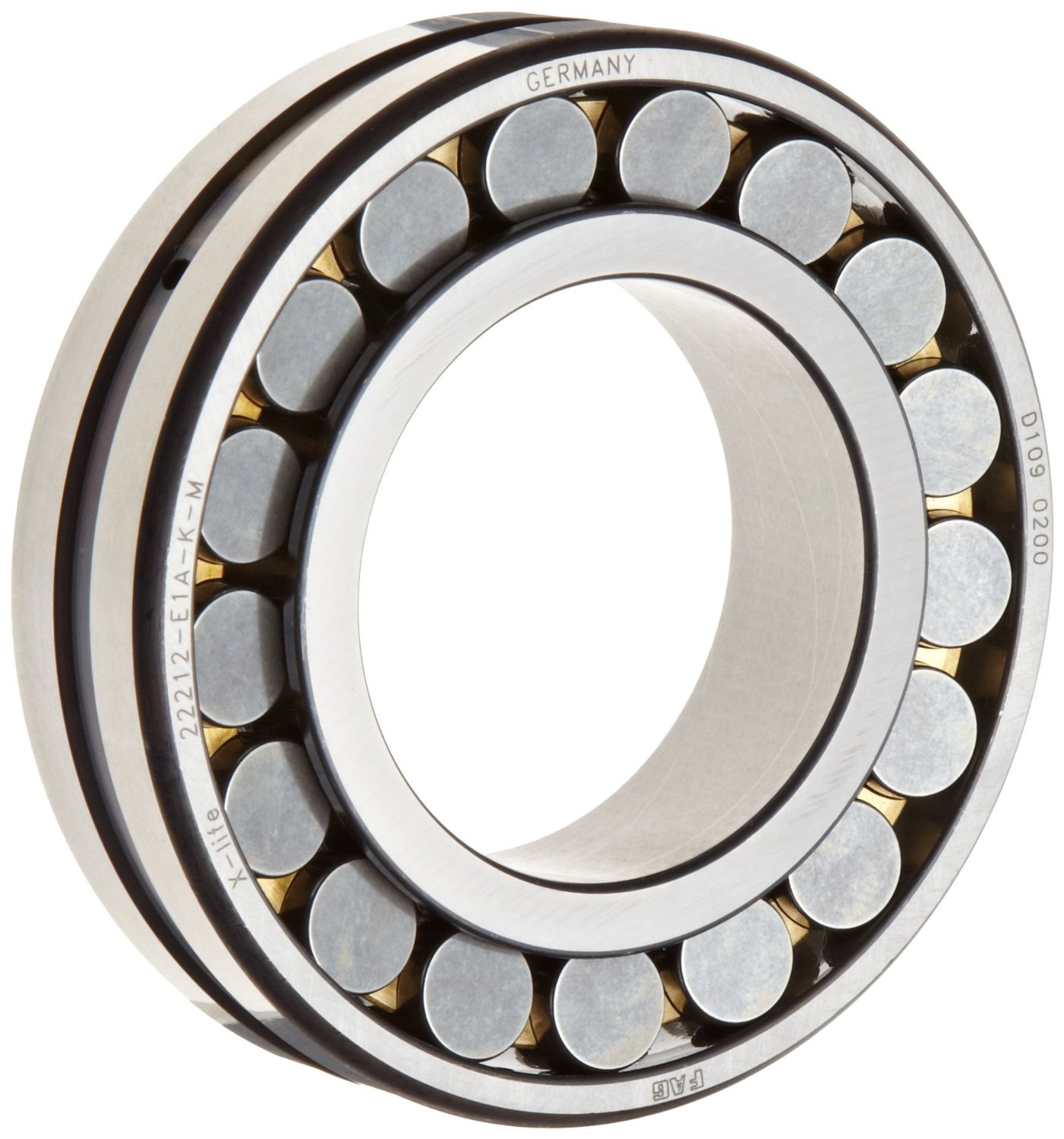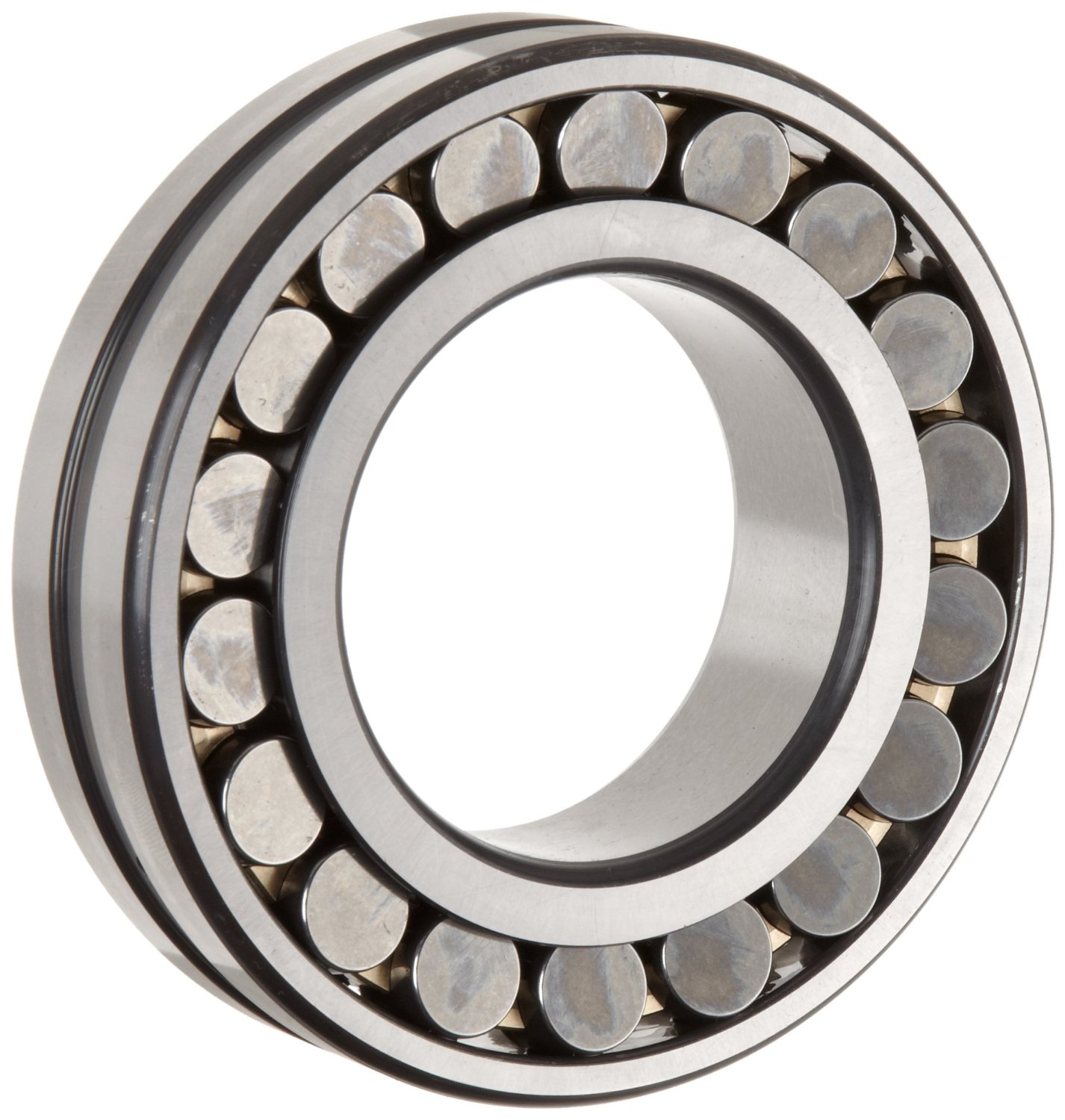Specifications for this item
Brand Name FAG Bearings
Part Number 22213-E1A-K-M
Material Type Brass/Bronze Cage
System of Measurement Metric
Bore Diameter 65 mm
Outside Diameter 120 mm
Overall Width 31 mm
Max Rotational Speed 6700 RPM
Static Load Capacity 208 Kilonewtons
Dynamic Load Capacity 200 Kilonewtons
EAN 4026677847287
Manufacturer Series Number E1 Series
Number of Items 1
UNSPSC Code 31171505
Product Features
Double row spherical roller bearing for applications that support radial and oscillating axial loads
CN (normal) radial clearance for applications where thermal expansion is not a factor
Tapered bore with 1:12 taper for compensating for a flexing shaft or fitting to a tapered shaft
Roller-guided brass cage evenly spaces rollers for reduced friction, vibration, and noise
Open design, circumferential groove and three lubrication holes in the outer ring allow for lubrication in place
Product Description
This FAG double row spherical roller bearing with a brass cage is suitable for applications that support radial and oscillating axial loads. It has a CN (normal) radial internal clearance designation making it suitable for applications where the load and speeds do not result in thermal expansion. This clearance provides latitude for self-realignment and compensates for static and dynamic alignment errors. The bearing’s two rows of symmetrically arranged barrel rollers, which are oriented on a concave raceway, are designed to support axial loads in either direction, including those with restricted diameter tolerances (as with an oscillating shaker conveyor). This bearing is rated “Light,” making it applicable for use for average loads or where space is tight, it has a larger roller set than standard rollers for additional durability, and it can be used to a maximum operating temperature of 200 degrees C/392 degrees F. The bore is tapered with a standard 1:12 taper, giving the bearing the ability to compensate for a flexing shaft, or to fit on a tapered shaft. The inner and outer rings and barrel rollers are made of a low-alloy, through-hardened chromium steel for durability, heat tolerance, and resistance to deformity under heavy loads. The roller-guided solid brass cage prevents the barrel rollers from coming into contact with each other during use, reducing friction, vibration, and noise. The outer ring has a center groove with three holes spaced evenly around it for adding lubricants. Bearings in the E1 series have been manufactured under FAG’s improved engineering processes, resulting in a rating life that is more than double that of the same bearing from the E series. This spherical roller bearing is for use in various applications such as jaw crushers, impactors, cone crushers, and conveyors, among others.
Specifications
Main bearing dimensions DIN 635-2
Basic dynamic load ratings DIN ISO 281
Dimensional and geometric tolerances DIN 620-2, tolerance class PN
CN radial internal clearance DIN 620-4 (ISO 5 753)
Through-hardening steel for inner and outer rings and rollers ISO 683-17
System for creating part numbers for rolling bearings DIN 623-1
Roller bearings use rolling elements to maintain the separation between moving parts to reduce rotational friction and support radial and axial loads. These elements can be one of the following types: ball, cylindrical, spherical, barrel, needle, spindle, or tapered. All roller bearings are open, shielded, or sealed. Sealed bearings are lubricated with oil or grease in the bearing factory, while open and shielded bearings are meant to be lubricated in place, with periodic reapplication of lubrication, based on use. The shield protects the working parts of the bearing from environmental debris that may be introduced and could reduce the ball bearing speed and lifespan. Rolling bearings are used in a range of applications from agricultural machinery to conveying equipment, robotics, dental equipment, elevators, rolling mills, ship rudder shafts, and aggregate crushers, among others.
FAG manufactures a variety of bearings that meet International Organization for Standardization (ISO) and Deutsches Institut für Normung (DIN) standards for quality assurance. Founded in 1883, FAG is based in Schweinfurt, Germany.



